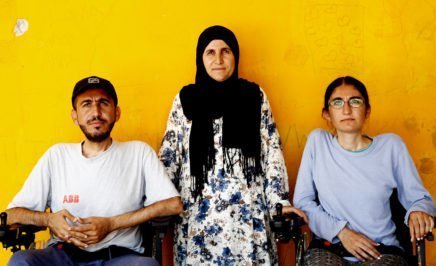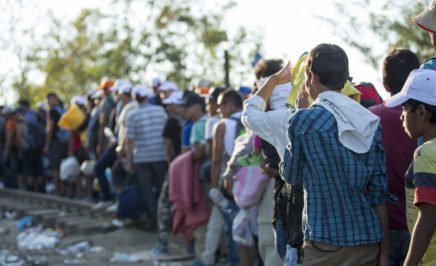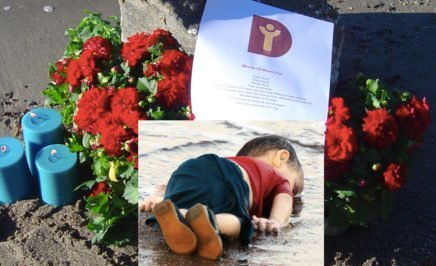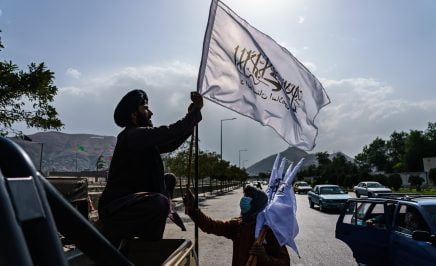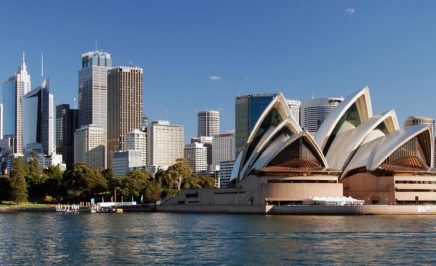“When I close my eyes, all I see is being with my father again,” Alan Mohamed told me when I met him for the first time in a refugee camp near Athens last July. He and his sister Gyan, who have both suffered from muscular dystrophy since birth, thought that moment might never come.
But, on Thursday night in Hanover, Germany, against all the odds and after a journey that saw them cross four borders and spend the past year stranded in Greece, their family was finally reunited.
Their emotional reunion is the culmination of a seemingly impossible journey that they started together as a family in Syria in the summer of 2014.
Back then, Alan and Gyan, who use wheelchairs, lived in Al-Hakasah, with their parents, two sisters and brother. With the armed group that calls itself Islamic State closing in on the town, the family had no choice but to flee.
After three failed attempts at crossing the border into Turkey, each time being shot at by police, the family eventually managed to reach Iraq. They stayed there for a year and a half before the approach of IS again forced them to escape. From there their father carried on with one of his daughters, and was able to reach Germany.
The rest of the family once again attempted to travel to Turkey, but this time via mountainous terrain completely impassable by a wheelchair user. In February last year, Alan and Gyan made the journey strapped onto either side of a horse, which was led by their younger sister. Meanwhile, their heavy wheelchairs were pushed up the steep, unpaved paths by their mother and brother.
‘It is like a miracle’
When I met Alan that summer, he told me: “It was a very difficult journey, for ‘normal people’ it is very difficult. But for disabled people it is like a miracle because all the borders between the two countries [Iraq and Turkey] are mountains.”
Having reached Turkey, the family paid $750 each to a people smuggler for passage to Greece with 60 other people crammed aboard a tiny, inflatable vessel. Alan and Gyan had to leave the wheelchairs behind as the smugglers wanted to use the space to fit more people in.
“Every time I looked around I saw babies and children crying… My mother became faint and at one point my sister told me she could not go on any more”
A short time into the perilous crossing, the boat’s engine gave out and they were left adrift in Turkish waters for around four hours. “It was terrifying,” recalls Alan. “Every time I looked around I saw babies and children crying… My mother became faint and at one point my sister told me she could not go on any more.”
After some passengers eventually succeeded in restarting the engine, they managed to reach Greek waters, where they were rescued by the Greek coast guard. The family were then transferred to the island of Chios, where Alan and Gyan were given wheelchairs.
Their arrival on the island, on 12 March, came just days before the EU-Turkey deal came into effect. This meant that the borders of other European countries were now closed and hopes of a reunion with their father and sister in Germany appeared remote.
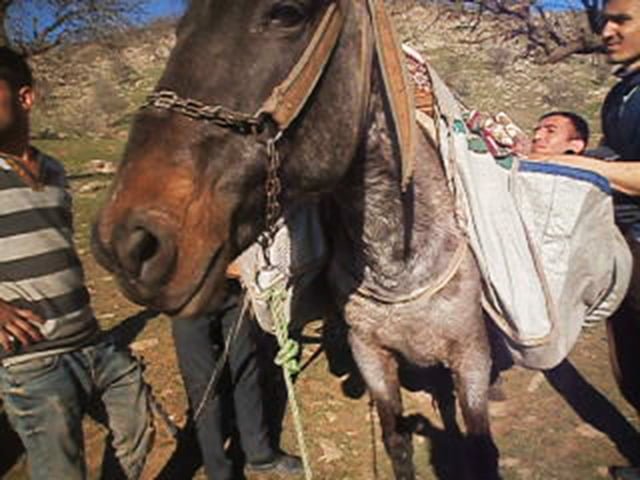
The family were made to board a ferry to the mainland and from there were taken by bus to Ritsona refugee camp. Situated on an abandoned military base in the middle of a forest, life in the camp was challenging. The sandy, uneven ground made it particularly hard for Alan and Gyan to get around and the food was so poor that much of it was discarded, attracting wild boars.
Following their first interview with the Greek Asylum Office, at the end of September 2016, the family were moved from Ritsona camp to a hotel in Khorithos an hour north of Athens with the support of the UN High Commission for Refugees.
Then, a week ago they received the news they had been waiting for. On a visit to the asylum office they were told to go home and pack their bags for a flight to Munich and last Thursday night they were reunited with their father and sister at a centre for refugees outside Hanover.
A new life
Alan and Gyan are now ready to settle into their new life in Germany. They are already learning the language and they are aware of the challenges of living in a different country. But they also know how lucky they are, and still think of others languishing in camps in Greece aafter an unforgiving winter.
“I feel very sad for all my friends and all the refugees I have left behind. There are children and babies there and they are in a very bad situation. Please don’t forget them”
“I hope they find a solution for the people who are stuck in the islands… some of them died because of the snow a few weeks ago. It’s very difficult for them. I saw the photos of the people in the islands and it was very painful for me to see them in tents under the snow,” Alan told me.
In 2015 the EU committed to relocate 66,400 people from Greece within two years. As of 10 March, only 9,925 have travelled to other European countries with the relocation program so far. Clearly, Europe can and must do more to accept refugees from Greece through relocation, family reunification or humanitarian visas.
To many, these are mere statistics. But to Alan and Gyan, they include their friends and compatriots. Happily, Alan no longer has to close his eyes to imagine being with his father but as he told me once: “I feel very sad for all my friends and all the refugees I have left behind. There are children and babies there and they are in a very bad situation. Please don’t forget them.”
Your generous gift can help refugees like Gyan and Alan.
Donate today
This article by Monica Costa Riba was first published by TRT world.
